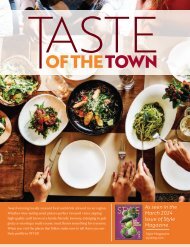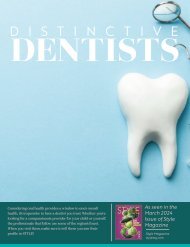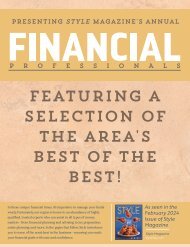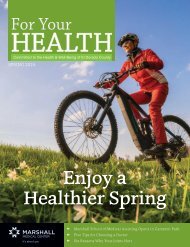Style Magazine July 2020
Let’s rewind for a minute to early March. Before life as we knew it came to a screeching halt. I was a distracted mom, driver, wife, and worker who was religious about my routine, took things like haircuts and hugs for granted, and had big plans to see the world this summer. Then, COVID-19. Need I say no more. For anyone who likes to be in control and is a creature of habit, it was the ultimate lesson in letting go and realizing that the only thing we truly have control over is our attitude. Despite the challenging moments, the tears, and the fears that my own family faced, the situation ultimately brought us, and our community, closer. It was a time—a lot of time—of reset, reflection, and, yes, reruns. I embraced the multiple months at home by learning a few new skills (baking sourdough bread and bagels), savoring every second with my daughter who’s growing way too fast, planting a pretty—and pretty prosperous—garden, and gaining a new appreciation for my neighborhood and the people and places that make it thrive. Another positive thing to come out of quarantine? The rates of pet adoption and fostering significantly spiked. As touch between humans became taboo and people started spending endless hours in the comfort of their crib, owning an animal became even more enticing. Just turn to this month’s feature, “Incredible Pets,” on page 53 to read about two lucky pups who were adopted amid the pandemic (Daphne and Lady), plus other four-legged friends who live, and are loved, locally. We also share a lengthy list of area animal rescues, tips for summer pet safety, easy ways to pamper your pet, and furry friends to follow on Instagram. It’s a feel-good feature you won’t want to miss. As life slowly returns to (a new) normal, I hope we continue to be more present, spend ample time outside—and in the kitchen—and, maybe most importantly, support the small businesses that support us on a daily basis. Cheers! — Megan // megan@stylemg.com @meggoeggowaffle
Let’s rewind for a minute to early March. Before life as we knew it came to a screeching halt. I was a distracted mom, driver, wife, and worker who was religious about my routine, took things like haircuts and hugs for granted, and had big plans to see the world this summer. Then, COVID-19. Need I say no more. For anyone who likes to be in control and is a creature of habit, it was the ultimate lesson in letting go and realizing that the only thing we truly have control over is our attitude.
Despite the challenging moments, the tears, and the fears that my own family faced, the situation ultimately brought us, and our community, closer. It was a time—a lot of time—of reset, reflection, and, yes, reruns. I embraced the multiple months at home by learning a few new skills (baking sourdough bread and bagels), savoring every second with my daughter who’s growing way too fast, planting a pretty—and pretty prosperous—garden, and gaining a new appreciation for my neighborhood and the people and places that make it thrive.
Another positive thing to come out of quarantine? The rates of pet adoption and fostering significantly spiked. As touch between humans became taboo and people started spending endless hours in the comfort of their crib, owning an animal became even more enticing. Just turn to this month’s feature, “Incredible Pets,” on page 53 to read about two lucky pups who were adopted amid the pandemic (Daphne and Lady), plus other four-legged friends who live, and are loved, locally. We also share a lengthy list of area animal rescues, tips for summer pet safety, easy ways to pamper your pet, and furry friends to follow on Instagram. It’s a feel-good feature you won’t want to miss.
As life slowly returns to (a new) normal, I hope we continue to be more present, spend ample time outside—and in the kitchen—and, maybe most importantly, support the small businesses that support us on a daily basis. Cheers!
— Megan // megan@stylemg.com
@meggoeggowaffle
Create successful ePaper yourself
Turn your PDF publications into a flip-book with our unique Google optimized e-Paper software.
| health & wellness |<br />
3<br />
Increased Risk of Falls<br />
Hearing loss is also linked to an increased risk of falls in<br />
seniors, which oftentimes can be life-threatening. Dr. Payne says<br />
researchers at John Hopkins University, in coordination with the<br />
National Institute on Aging, concluded that those with hearing<br />
loss—even mild hearing loss—were significantly more likely to<br />
fall than those without hearing loss. “They also concluded that the<br />
greater the hearing loss, the greater the risk—from three times<br />
greater for mild loss to seven times greater for severe loss,” he says.<br />
Hearing loss that initiated cognitive overload would impact balance<br />
through a decreased awareness of surroundings, which could lead<br />
to the damaging falls. “Researchers at Washington University School<br />
of Medicine concluded that hearing aids appear to improve balance<br />
in older adults,” he says.<br />
4<br />
Impact on Overall Health<br />
Dr. Payne says diagnosis and treatment of hearing loss can lead to<br />
a better quality of life and overall improved health. “Like heart disease<br />
and diabetes, the longer hearing loss is unaddressed, the greater the<br />
impact on a person’s health.” Studies show that those with hearing loss<br />
are more likely to suffer psychosocial disorders such as depression,<br />
anxiety, fear, anger, paranoia, withdrawal, and isolation. Relationships<br />
with friends and loved ones will also suffer, as those with difficulty<br />
hearing may become more isolated out of embarrassment of being<br />
unable to hear or understand, Dr. Alden says.<br />
ERIC J. STEINBRECHER, D.D.S., INC.<br />
PRECISION DENTAL GROUP<br />
Dental implants,<br />
Oral surgery,<br />
sedation dentistry,<br />
and Prosthodontic<br />
services.<br />
Ask about our In<br />
Office Savings<br />
Plan<br />
FREE<br />
WHITENING<br />
with paid exam<br />
and xrays<br />
First time clients only<br />
7803 Madison Ave. | Citrus Heights<br />
916-961-6406 | precisiondentalgroup.com<br />
doc@precisiondentalgroup.com<br />
Facebook: Precision Dental Group,<br />
Eric J. Steinbrecher, DDS, Inc<br />
Instagram: precisiondental_esteinbrecher<br />
5<br />
Increased Costs if Undetected<br />
Not treating your hearing loss might cost you more in the long<br />
run, especially if additional health conditions develop. “Hearing<br />
loss can increase the risk of developing dementia by 200-500%, and<br />
statistics show that the average family will spend approximately<br />
$57,000 per year to cover health care costs and manage the care of a<br />
loved one with dementia,” Forrest says.<br />
6 Prevention<br />
It’s never too late to protect your ears. “Hearing loss due to noise is<br />
preventable, so it’s imperative to be aware of how loud you’re listening<br />
to music and personal listening devices. Keep the volume down and<br />
make sure to wear ear protectors when working with loud power tools<br />
and equipment,” Dr. Young says. According to Dr. Alden, “Common<br />
chronic health conditions, such as diabetes and elevated blood<br />
pressure, can affect your ears...[also], let your doctor know if you start to<br />
experience hearing issues with your medication,” she says. Maintain<br />
regular check-ups with your primary care doctor once a year. “If you<br />
suspect hearing difficulty, a simple and quick office hearing test can be<br />
performed,” she says.<br />
7<br />
Improved Quality of Life<br />
Forrest, an Army veteran who was exposed to explosives, was<br />
diagnosed with hearing loss and tinnitus (ringing in the ears). “The<br />
medical treatment of hearing loss also helps relieve tinnitus,” he says.<br />
“It has really improved my quality of life and minimized the ringing.”<br />
Dr. Payne says improved hearing is improved health and quality of<br />
life. “If you have any concerns or if loved ones and friends complain<br />
about your hearing, have this discussion with your family doctor.<br />
Your issues may be as simple as wax occlusion or as significant as<br />
progressive ear disease process,” he says.<br />
34 stylemg.com | JULY <strong>2020</strong>

















